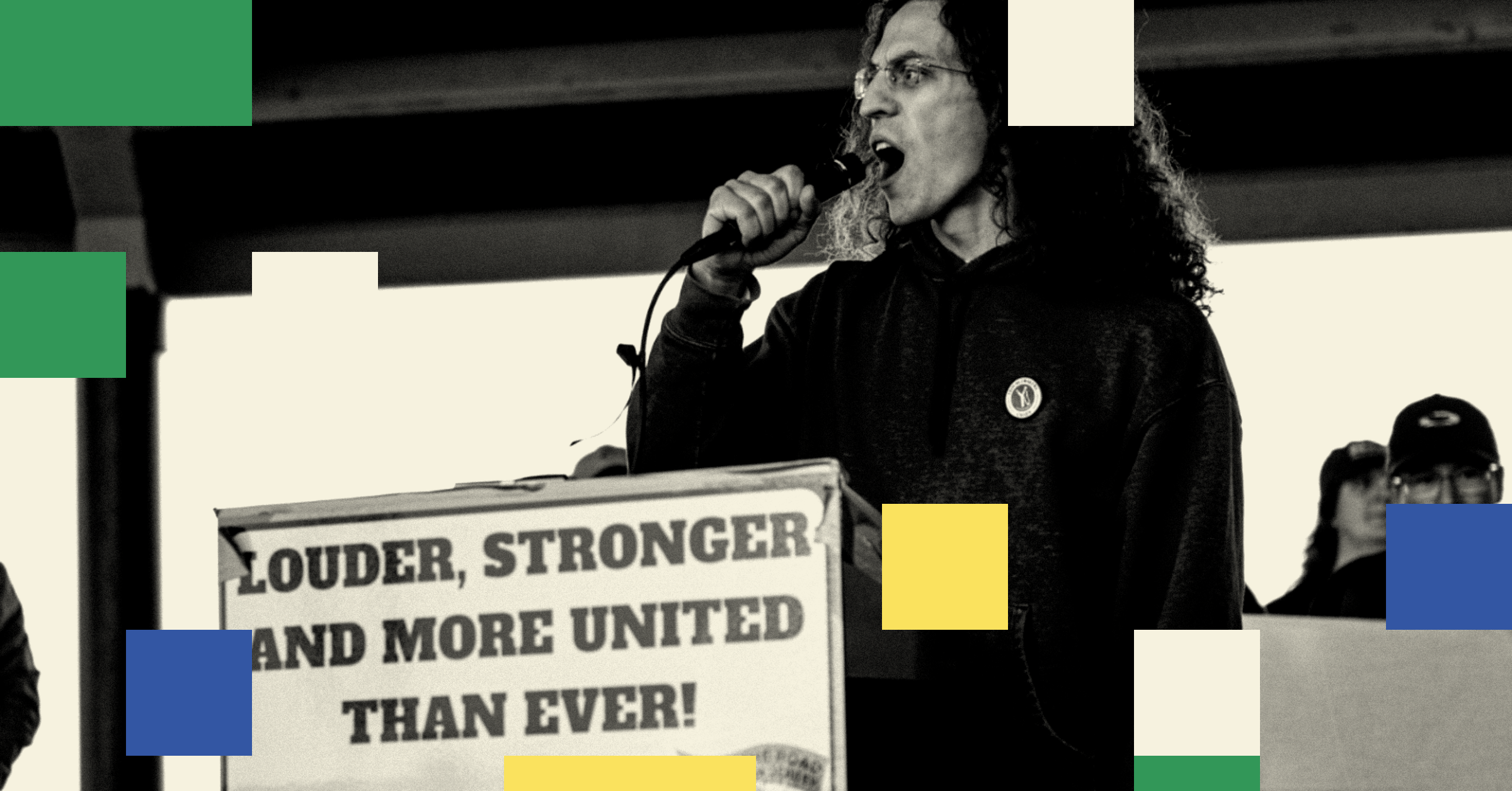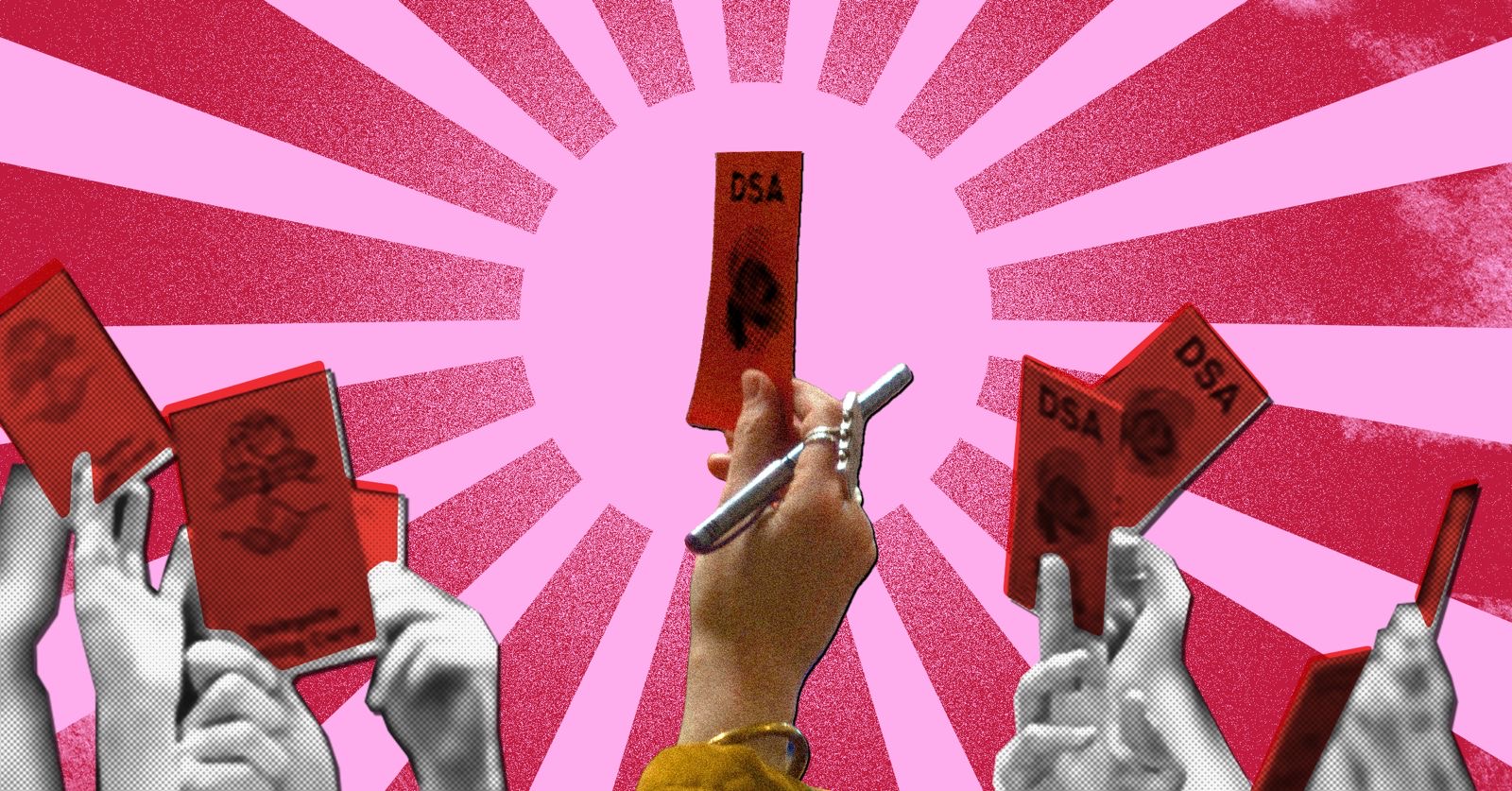At the 2023 DSA National Convention, delegates will debate whether national DSA adopts new party-building tactics in our electoral work. Bread & Roses is putting forward a proposal to do just that: to “Act Like an Independent Party.”
Why a Party?
Democratic socialists and working-class activists fighting to change the world need an organization that can represent our cause inside the U.S. state while also organizing a base of millions into a shared political project. Eventually, to organize a transition to democratic socialism, we’ll need representatives in the state and popular movements from below working together against capital, using the power of our own organization and discipline. That’s the vision of the democratic road to socialism.
We can’t achieve this vision without a party, and to create a party in the near term DSA needs to make serious, specific commitments now. Otherwise we will continue to be buffeted by the tide of “politics as usual” in the U.S., which is actively hostile to our project in a number of ways. Without a real party, our politics will struggle to become more than the sum of its individual electeds, who will face mounting pressure to govern as individuals and to play the game of cutting deals and winning prizes for local interests in order to stay in office.
We’re not against state funding for parks and libraries! But democratic socialists are built differently, we want to change the world. Our vision is big: workers’ control of production, winning Medicare for All and a Green New Deal, guaranteeing abortion rights for everyone, socializing the big companies and banks, ending police brutality and mass incarceration, breaking the power of Wall Street, unionizing jobs everywhere. You can’t win those things as a collection of well-networked individuals focused on winning funds for our districts to pave streets. You need the power of organization, discipline, and a mass base of people who have a political identity that’s bigger than “voter.”
That’s what a party in its most basic meaning is. Hundreds of thousands, even millions, of people coming together to organize their communities, mobilize, build working-class power in workplaces, elect democratic socialists up and down the ballot, force the government to serve the people and then to help remake the world.
Why Independence?
Building our own party-like organization will be really hard, especially when so many people we want to organize already identify, grudgingly or not, with the Democratic Party. So why shouldn’t we try building the party we want with the apparatus they already have? After all, the Democrats are clearly vulnerable to socialist insurgents, whether that means losing primaries to candidates like AOC or having to contend with growing socialist blocs in places like New York, Los Angeles, and Chicago.
Since the 1960s, some democratic socialists have seen openings to try to make the Democratic Party into the party that we need. They embraced a strategy called realignment. Their goal: push the Democrats to the left by entering its official committees and by building relationships with sympathetic Democratic Party leaders, with a goal of realigning the party towards a working-class base and leftist policy goals.
The problem is that these activists believed that the Democratic Party could be transformed from the bottom up.
To change the party, we have to understand what it actually is. On paper, it’s composed of its official machinery — the DNC, state and county party committees, fundraising arms, and similar structures. But who actually controls these? Certainly not voters, and in practice, the party doesn’t even adhere to decisions made by its own official internal structures. Instead, when it really matters, informal structures and power bases call the shots. Some activists in DSA learned this the hard way when they tried their own realignment strategy in Nevada in 2021. DSA activists helped seize the formal state party apparatus for the left. It looked like a radical takeover of the party, but the real power players in the state party were unfazed. They simply set up their own alternate structure, taking the party’s money, lists, and tools with them, and have continued dominating internal Democratic politics since (an outcome we warned was likely immediately after the takeover).
The most important source of informal power in both parties is the donor class. The donations of the very wealthy and corporate interests keep the party machinery running, backed up by the massive informal machinery housed in nonprofits and other associated Democratic and progressive organizations. At local levels, the donor class is often held up by a “local gentry” of small business owners, real-estate developers, and other “moderately” wealthy professionals.
Coexisting uneasily alongside this elite are elements of the base for democratic socialism, including ordinary workers, tenants, labor unions, and grassroots activists like those cultivated by Bernie Sanders. Any socialist break with the Democrats would be impossible without bringing along these more working-class parts of the party base. We need to continue talking to these people, which we wouldn’t be able to do if we declared a third party tomorrow.
But we also need to be clear that our politics is a zero-sum game between bosses, billionaires, and landlords on one side, and ordinary workers, tenants, and left organizers on the other. A party in thrall to the former will never submit itself to control by the latter. They might permit us to be junior partners at times, but we have to be friendly to them to even maintain that footing.
For many years in DSA, the dominant strategy was to attempt to realign the Democrats into a true workers’ party free from corporate influence. With the explosion in membership that followed Bernie Sanders’ presidential campaign in 2016, DSA has largely moved away from a realignment strategy towards one that is more confrontational to the Democrats.
In 2019, DSA passed a resolution on “Class Struggle Elections” that committed the organization to eventually creating an independent workers party. How to achieve such a party is still up for a lot of debate. In DSA there are still some advocates of realignment, and others who advocate for a “clean break” into an independent DSA-led workers party right now. But most active members of the organization have moved away from those positions. Instead there is agreement around the need to build up electoral infrastructure in a “proto-party” or “party surrogate” formation, but different opinions about how we do this, to what end, and whether an independent ballot line (separate from the Democrats) will eventually be necessary.
Amendment I: Acting Like an Independent Party in the 2020s
While it’s an exciting development that the organization has recognized the need for an independent party-like organization, without a clear vision of how to proceed we can expect this opportunity to pass us by. A DSA that fails to seize the moment and begin a bold course toward the party we need will be a DSA that fumbles the moment.
That’s why Bread & Roses has proposed Amendment I: “Act Like an Independent Party” to the 2023 DSA National Convention. Amendment I would add concrete action items to the National Electoral Commission (NEC) Consensus Resolution so we can take meaningful steps towards acting like an independent party in the next few years.
The Consensus Resolution is a positive for the organization in several key ways. Most importantly, it maintains the basic electoral strategy that DSA approved in 2021: building towards a mass party of the working class. It has some strong elements about building the infrastructure and capacity necessary to scale up DSA’s electoral work as a singular national organization. It also contains important reforms to the NEC’s structure which will invite more participation from regular members of DSA.
However, the base resolution does not answer pressing and contested strategic questions like how confrontational DSA should be towards the Democratic Party. Our Amendment I will help supplement the base resolution with a strategy for building our party-like organization, but also allow the NEC and chapters to retain the flexibility needed considering DSA’s big tent nature and the demands of different locales.
Amendment I starts by making the case for why DSA needs to act like an independent party. DSA needs a roadmap to become an independent force in the U.S. that can mobilize, organize, and empower the huge chunk of working-class people who are angry about the status quo, are opposed to the far right, but for good reason don’t view the Democratic Party as representative of their interests. Without this language, the Consensus Resolution could pass without a clear perspective about how DSA can help mobilize and organize the growing sense of anger and frustration with both parties spreading throughout the U.S., putting us in danger of watching a fortuitous political moment slip through our fingers.
To flesh out this vision, Amendment I adds three points clarifying and strengthening the base resolution’s focus on gaining independence from the Democratic Party.
Organizational Independence
First, we think it’s possible to strengthen DSA’s already existing organizational independence from the Democrats. Amendment I set goals including:
- Building our own lists of voters and volunteers, not relying on other organizations or the Democrats to share their lists (this is something we’re already doing in many places across the country).
- Continuing to develop and flex our independent fundraising capacity.
- Using the NEC to launch our own candidate schools to train the next generation of democratic socialist candidates, rather than waiting for progressives to come to us for endorsement.
- Eventually building our own tech tools, rather than relying on tools which are tied to the Democratic Party and which therefore can be revoked from us at any point.
Strategic Independence
Second, we think it’s necessary to have our own collective strategy that’s independent from the Democratic Party. Truthfully, DSA has been less effective at doing this to date than it could be. In some of our chapters, like NYC-DSA, there are impressive efforts to launch Socialists in Office committees to create socialist voting and coordination blocs in legislatures. There are a lot of challenges to solve here, but it’s a good first step. Now it’s time to build SIO committees all across the country, and start to share lessons from these efforts. We also need to be more rigorous about expecting our candidates to endorse each other and to vote as a bloc in legislatures. We’re members of the largest socialist organization in the country working to build a mass movement, not a collection of radical individual political personalities. We should act like it.
An Independent Identity
Finally, we think it’s essential that DSA starts to develop an independent, collective identity as a political force in the U.S. We need our candidates to be bold about running as “democratic socialists” both on social media (where they’ve often been pretty good about this, but that’s because they’re speaking to the activist base) and in campaigns and in their literature. We need to start sewing together all our campaigns with a common look and feel. Left-wing parties (and parties of other ideological traditions too) almost everywhere else in the world run under a single collective identity nationwide to increase people’s identification with their collective project (see, for example, MORENA in Mexico, Die Linke in Germany, the Partido dos Trabalhadores and the Partido Socialismo e Liberdade in Brazil). DSA needs to present ourselves as a cohesive, collective project in order to build a base that identifies with democratic socialism as the alternative to far-right Republicans and center-right Democrats.
Next Steps
Of course, we know that strategy at a national level can’t be too prescriptive. DSA’s electoral work is at different stages of development across the U.S., so it would be a mistake to insist on a one-size-fits-all approach in every case. For example, in some chapters there might arise opportunities to build left-wing coalitions with groups that aren’t socialist but which have working-class bases, or to support insurgent political campaigns by a strong labor organizer or a community activist who does not yet want to be part of a party-like project as we envision here. We wouldn’t want to prevent chapters from experimenting with openings like this.
Nevertheless, the National Electoral Commission should be tasked with developing programs and strategies that help DSA move towards becoming an independent party-like organization, and this means creating a national standard (that chapters can diverge from when appropriate). Over time, we should all seek to orient our electoral infrastructure towards the same goal: building a mass party of, by, and for the working class.
DSA can act like an independent party. We’re excited to be part of a DSA that takes these big strides now, and to help support a National Electoral Commission that can make this happen. We’ve been energized by the amount of support the amendment has already received. And yes we still believe that in the future, DSA and whatever working-class party we help build will need to take even bigger strides in the future, including one day winning its own ballot line. But let’s move step by step. Big opportunities are ahead of us, let’s get to work.




